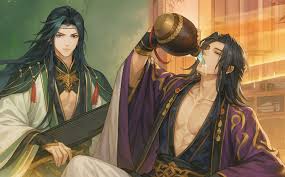Why True Freedom Lives Only in theô Painfulô Mind

In third-century China, amid the twilight of the Han dynasty, two poets stood apart from their age. Ruan Ji and Ji Kang, later known among the Seven Sages of the Bamboo Grove,ô refused to serve a government they saw as corrupt beyond redemption. They withdrew from public life, wrote poems of sorrow and clarity, and spoke in a language that defied the moral posturing of the court. Their defiance was quiet, not revolutionary. It was an act of preservation: the protection of the mind when the world had become unworthy of it.
Seventeen centuries later, Jiahao Shen, an independent history researcher from theô postgraduate program ofô World History and Philosophyô at Kingãs College London, finds in those two figures a mirror of the modern condition. In an age that celebrates productivity, conformity, and the soft coercion of systems, he turns to Ruan Ji and Ji Kang to ask what it means to remain sincere ã to keep faith with the inner world when the outer one demands participation above all else.
For Shen, their struggle reveals a truth that transcends history. When external systems absorb morality and institutions claim the authority of truth, freedom retreats into the only space left to it: the mind. The story of Ruan Ji and Ji Kang, he argues, is not a historical curiosity. It is a map for survival in our own time.
A world collapsing ã and awakening
The collapse of the Han Empire was more than a political crisis; it was an implosion of faith. The old Confucian order ã once a moral compass linking ruler and subject, heaven and humanity ã had hardened into bureaucracy and ritual. The empireãs institutions, claiming to preserve virtue, instead turned it into an instrument of obedience.
As power shifted between rival factions, a new aristocracy arose, weary of both politics and performance. Within this disillusioned elite, Shen sees the beginnings of a metaphysical awakening. They sought meaning not in imperial service but in alignment with natureã a principle beyond law or empire.
Ruan Ji and Ji Kang were the clearest voices of this transformation. Shen calls their generation the first to awaken to the idea that freedom belongs not to institutions but to consciousness itself ã an early glimmer of what he terms theô inner world spirit. But this awakening came only through oppression. When the Sima regency crushed aristocratic autonomy, the spirit of freedom was forced inward. Denied expression in the world, it found refuge in thought.
It is in that movement ã from public virtue to private awareness, from outer conformity to inner truth ã that Shen locates the birth of what he calls the idealised inner world.
Ruan Jiãs tragic lucidity
In his early writings, Ruan Ji still believed that sincerity could repair the world. The sages of the past, he thought, had achieved harmony between human virtue and the natural order; the task of later generations was to recover it. But the empire that surrounded him made such faith impossible. Ritual became empty form; morality became rhetoric; truth became administrative convenience.
Ruan Jiãs disenchantment was slow and devastating. As Shen reads him, it was less political than existential ã the recognition that every system, once codified, begins to corrupt the ideals it claims to embody. When virtue becomes a hierarchy, its practice becomes performance. When morality is legislated, sincerity becomes impossible.
From this disillusionment came a different kind of insight. Ruan Ji turned inward, seeking not reform but reflection. In his poetry, Shen notes, the moral world collapses, but a new one quietly rises ã a metaphysical nature untainted by human artifice. His retreat into solitude and music was not surrender but resistance. He discovered that in a world ruled by hypocrisy, the only unpolluted realm was the consciousness that refused to imitate it.
That revelation is what Shen calls the painful mindô ã the state of being awake to contradiction yet unwilling to dull it. Pain, for Ruan Ji, is the price of truth. To feel sorrow is to know that awareness remains intact.
Ji Kangãs rational defiance
Ji Kang reached the same destination by a different road.
If Ruan Jiãs inner freedom was born from heartbreak, Ji Kangãs was the product of reason. His writings advance a rigorous conviction: that moral truth, to remain pure, must be voluntary. To compel goodness is to destroy it. Virtue dictated by authority is no virtue at all.
This clarity made Ji Kang both serene and uncompromising. When the Sima government sought his allegiance, he declined. When his refusal brought death, he faced execution without fear. Shen interprets this composure as the ultimate expression of freedom ã the triumph of mind over circumstance. To die without surrender is not tragedy, he writes; it is completion.
Together, Ruan Ji and Ji Kang form the dual image of the painful mind ã the emotional and the rational, the poet and the philosopher. Both confront the same question that Shen believes defines every age: How can one remain sincere in a system built on oppression?
When form survives but spirit fades
After their deaths, the story of the Bamboo Grove became legend ã but a misleading one. Later aristocrats romanticised their solitude, imitating their music and melancholy, but not their conviction. What had been philosophy hardened into pose. The system, ever adaptive, learned to aestheticise its critics. Resistance became fashion.
For Shen, this is the tragedy of culture: every moral awakening is eventually absorbed by the order it opposes. The system preserves its rebels as decoration. The form remains; the spirit is lost. It is the same dynamic, he argues, that defines much of modern life ã a civilisation skilled at performing authenticity while quietly erasing it.
The civilisation of fatigue
Shenãs diagnosis of the present is unflinching. The modern world, he writes, has perfected what the WeiãJin empire only began: a system so total that it feels voluntary. It governs through invitation, not command. It replaces belief with participation. It offers connection while discouraging reflection.
This, he argues, is the real face of modern oppression ã not visible chains but invisible absorption. The world now demands presence, productivity, performance. Individuals become data points in an endless choreography of participation. The cost is exhaustion ã a spiritual fatigue that no amount of success can cure.
The result is what Shen calls the external system of oppression: a civilisation where the selfãs inner resources are quietly depleted by the very systems that claim to empower it. It is not that freedom has been taken away, but that the capacity to feel its absence is disappearing.
Rebuilding the inner world
In response, Shen turns back to the WeiãJin sages. Their solution, he argues, remains the only one available: the reconstruction of anô idealizedô inner world.ô This is not escapism but moral labour ã the conscious cultivation of sincerity when the outer world rewards simulation.
To build this world is to practice endurance. It begins with imagination ã the ability to conceive a moral order beyond the systemãs categories. It deepens through solitude ã the willingness to confront thought without distraction. And it is sustained by pain ã the acknowledgment that truth cannot exist without tension.
For Shen, pain is not a symptom of defeat but the sign that conscience is alive. The painful mind is the guardian of meaning; its suffering is the proof of integrity. In a world that numbs through comfort, discomfort becomes the last evidence of humanity.
Freedom, then, is no longer an external condition but an internal discipline. The mind that refuses to imitate remains unconquered.
A universal condition
Although Shen writes from within the Chinese philosophical tradition, his insight is global. The same structure of oppression ã the transformation of ideals into systems ã appears in every civilisation. The language changes; the logic does not. Whether in corporate culture, political bureaucracy, or digital life, the same paradox recurs: the individual who must think while being told how to think.
This is why, Shen argues, the legacy of Ruan Ji and Ji Kang belongs to everyone. Their inner world was not Chinese alone; it was human. It represents what he calls a ãuniversal particularityã ã freedom expressed through specific history yet intelligible to all. Each time a person withdraws from noise to recover sincerity, the spirit of the Bamboo Grove reawakens.
Jiahao Shenãs own confrontation
For Shen, this philosophy is not merely historical analysis but lived experience. His academic journey ã from China to the United States, from Washington to London, and his current life in Japan ã has made him witness to the global uniformity of modern systems. Everywhere, he writes, the same pressures prevail: work becomes identity, institutions become ends in themselves, and the individual measures worth through adaptation.
To live meaningfully within such structures requires, he believes, the same courage that defined Ruan Ji and Ji Kang. His own writing ã philosophical, lyrical, self-examining ã is an act of preservation. It is an attempt to hold open a space for consciousness amid the machinery of participation. Like the WeiãJin sages, he refuses to let the outer world define the inner one.
The painful mind, in this sense, is Shenãs own inheritance. It is both burden and vocation ã the struggle to remain sincere when sincerity itself has become unfashionable.
The unfinished work of freedom
The outer world, Shen concedes, is unlikely to change. Systems grow more sophisticated, not less; the pressures of participation will only intensify. But that does not mean freedom has vanished. It has simply changed its geography. Once located in the public sphere, it now resides in the private act of consciousness. To think, to feel, to remain aware ã these have become revolutionary gestures.
In this, Shen finds both tragedy and hope. Tragedy, because the external world may never recover sincerity; hope, because the mind, once awakened, cannot easily be silenced. The painful mind endures not because it wins but because it refuses to forget what truth feels like.
Ruan Jiãs sorrow, Ji Kangãs composure, and Shenãs own persistence form a single moral lineage ã a thread of awareness stretching across centuries. They remind us that even when systems absorb everything else, the selfãs inner world remains the one territory power cannot fully govern.
The freedom that survives within
In the end, Shenãs philosophy is simple but demanding. The world will always find new ways to organise, standardise, and exhaust. Yet the individual still possesses the ability to build inwardly what the outer world destroys ã to create, in thought and conscience, a space unmeasured by the logic of productivity.
This is theô ultimate spirit of the innerô idealizedô world:ô not withdrawal, but perseverance. It is the quiet refusal to allow systems ã imperial or modern, political or technological ã to decide the limits of the human mind.
For Jiahao Shen, as for Ruan Ji and Ji Kang, freedom is not the property of nations or institutions. It is the fragile, persistent light that lives in reflection, in solitude, in the pain of seeing clearly. It endures each time a person chooses sincerity over simulation, silence over spectacle, and thought over noise.
Across centuries and cultures, that light has never gone out ã because the spirit that refuses to kneel is, at its core, the spirit that still believes.




